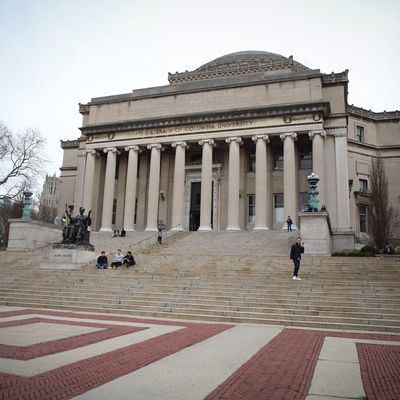
Nobody at Ethical Culture Fieldston School is sick, but the school is closing anyway. To protect its students from the novel coronavirus, the $52,993-a-year private school will post classwork online until March 13; after that, it’s spring break, which renders the risk of infection at school a moot point. The school is not alone. Brooklyn Friends, Riverdale Country, Horace Mann, Brearley, Browning, and Nightingale-Bamford have all emptied their classrooms. While students are at home, these expensive institutions will disinfect their facilities. The city’s public schools, meanwhile, remain open, and seem likely to remain that way. A similar divide exists among the city’s institutions of higher education. Columbia University cancelled classes. CUNY has not.
At this point in the outbreak, there may not be reason for New York City schools to close. Children aren’t that susceptible to the virus, and while closing schools may be valuable as part of a larger program of social distancing, the act probably doesn’t accomplish much on its own. In New Rochelle, for example, Governor Andrew Cuomo closed public schools alongside houses of worship and other public gathering spots, and only then to contain a particularly high rate of infection.
Whether the closures of schools like Fieldston are merited or whether they’re theater, meant to soothe anxious parents, the stratification they reveal remains roughly the same. Some schools can afford to close. For others, though, the decision is more complicated. When public schools close, the students they serve often go hungry. The ability to study from home requires computers, broadband access, adult supervision. Money can acquire all three. In working-class families, and in many middle-class families, too, any changes to the school schedule are interruptions they can’t afford. Maybe they can’t pay for child care; maybe they’ll miss shifts at work, and annoy managers who have the power to reduce their hours at will. COVID-19 is a new development, but in its short life, it has revealed much about the American way of life.
In times of crisis, the rich always have the furthest to fall. The stock market can plunge, as it did on Monday, and wipe billions from several fortunes with almost no real-world consequences for the men who built them. Bill Gates has billions more to spare, and so does Jeff Bezos. Even in less rarefied circles, where dwell the unlucky souls who are rich but not megarich, the consequences of COVID-19 must seem relatively minor. How else to explain the St. Louis family who violated a quarantine order? Despite having a sick relative and ignoring orders from the health department, the father took his teenage daughter to a school gala for Villa Duchesne, a Catholic girl’s school. (High school tuition: $23,135 a year.) The school closed for deep cleaning, and so did a coffee shop the man visited. No word on whether the employees who missed shifts will be compensated for them. The family is now back in quarantine at their home in Ladue, which is one of the wealthiest neighborhoods in Missouri.
Low-wage workers, meanwhile, inhabit a higher state of anxiety. Not only do many work with the public, where the possibility of coming into contact with the virus may be high, they lack basic labor rights. That’s a problem for workers, who can’t take measures to keep themselves healthy, and for members of the public, who have to interact with people who can’t afford to call out sick. The U.S. is the only developed country to not offer universal paid leave, which leaves workers dependent on the good graces of their employers. Democratic leaders, including House Speaker Nancy Pelosi and Senate Majority Leader Chuck Schumer, urged Donald Trump to pass some version of sick leave, which is a necessary if futile effort. The president seems more intrigued by the notion of a payroll tax cut, which would provide little benefit to low-wage workers. But some workers are taking the fight straight to their bosses. On a press call today, activists with Fight for $15 and a Union put forth a list of demands to their employer, McDonald’s. They want paid sick leave, updated safety protocols, a COVID-19 policy posted in every store, and compensation for the shifts they’ll lose if stores have to close, guaranteed to all workers whether they’re employed in a franchise or a corporate-owned store. They’re demanding security, a right that higher-wage workers already enjoy.
COVID-19 is no respecter of class — anyone can get sick. But some people are in more danger than others, and not just because of their biology. America exists in stratum. Each layer nestles next to the other, but they are distinct, kept apart by barriers that are difficult to breach. A man with a sick daughter can perceive the baristas who make his coffee, but he can’t empathize with them, not enough to stay away. Parents might feel equally anxious for the well-being of their children, but only a few have the power to close schools. The story COVID-19 tells about America is an ugly one. There is a class war, and the rich are winning.
This post has been updated to clarify Columbia and Fieldston’s cancellation decision.






























